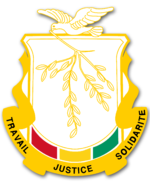National Assembly of Guinea
|
National Assembly Assemblée nationale |
|
|---|---|
 |
|
| Type | |
| Type | |
| Structure | |
| Seats | 114 |
|
Political groups
|
Guinean People's Assembly: 53 seats
Union of Democratic Forces of Guinea: 37 seats
Union of Republican Forces: 10 seats
Party of Hope for National Development : 2 seats
Union for the Progress of Guinea : 2 seats
Rally for the Integral Development of Guinea : 1 seat
Guinea For All : 1 seat
Union for Progress and Renewal : 1 seat
Guinean Union for Democracy and Development : 1 seat
Work and Solidarity Party : 1 seat
New Generation for the Republic : 1 seat
Guinean Party for Renaissance and Progress : 1 seat
Guinea United for Development : 1 seat
Generation for Reconciliation, Union and Prosperity : 1 seat
National Party for Renewal : 1 seat
|
| Elections | |
|
Last election
|
28 September 2013 |
| Meeting place | |
 |
|
| Conakry, Guinea | |
The unicameral Assemblée nationale or National Assembly is Guinea's legislative body. Since the country's birth in 1958, it has experienced political turmoil, and elections have been called at irregular intervals, and only since 1995 have they been more than the meaningless approval of a one-party state's slate of candidates. The number of seats has also fluctuated. It is currently at 114, with members selected by two different methods.
Two thirds of the members (76), called députés, are directly elected through a system of proportional representation, using national party-lists, while one third (38) are elected from single-member constituencies, using the simple majority (or first-past-the-post) system. Members must be over 25 years old and serve five-year terms.
The President of the National Assembly of Guinea is the presiding officer of the legislature. Claude Kory Kondiano has been President of the National Assembly since January 2014.
The Assembly is made up of 12 commissions:
The Assembly is responsible for ordinary laws and the government's budget.
It ordinarily meets in two annual sessions, beginning 5 April and 5 October (or the next working day if a holiday) and lasting no more than 90 days. Special sessions can be called by either the President of Guinea or a majority of the Assembly members.
The National Assembly has its headquarters in the Palais du Peuple (People's Palace), which was built with Chinese assistance.
Guinea was a one-party state, so the sole legal party, the Democratic Party of Guinea – African Democratic Rally, won all seats in the Assembly.
The Democratic Party of Guinea – African Democratic Rally once again secured all of the then-75 seats, and Ahmed Sékou Touré retained the presidency.
With no other parties legally allowed, the Democratic Party of Guinea – African Democratic Rally took all now-150 seats, and Touré was reelected president unopposed. Members were elected for seven-year terms.
...
Wikipedia
